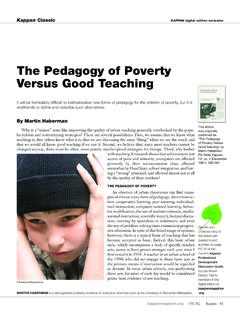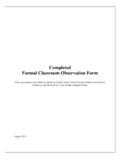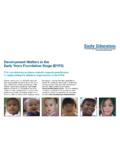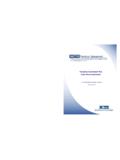Transcription of Effective Instructional Leadership Requires …
1 There is universal agreement that prin-cipals can play a pivotal role in the im-provement of student learning . Con-sequently, there is widespread agree-ment that principals should functionas Instructional leaders. Principalpreparation programs offer courses oninstructional Leadership , and education scholars havewritten volumes on the subject. These courses andbooks emphasize knowledge and skills related to cur-riculum alignment, teaching methods, classroom ob-servation, and evaluation and supervision of all of these dimensions of Instructional leader- Effective InstructionalLeadership RequiresAssessment LeadershipPrincipals must support their teachers use of assessments to improvelearning. But if principals are not trained to use assessments for learning ,how can they help?By Rick Stiggins and Dan DukeDECEMBER 2008 285 Photo: PhotoSpinnRICK STIGGINS is founder and executive director of the ETSA ssessment Training Institute, Portland, Oregon.
2 DAN DUKE is aprofessor of educational Leadership at the Curry School of Educationat the University of Virginia. 2008, Rick DELTA KAPPAN ship are crucial, they do not encompass the entire do-main. Instructional Leadership also Requires an under-standing of the role of sound assessment in efforts toimprove teaching and learning . The well-preparedprincipal is ready to ensure that assessments are ofhigh quality and used effectively. Yet, historically,preparation for productive assessment has been miss-ing from principal training programs. Principals can be pivotal in the improvement ofstudent learning by helping teachers develop and usesound classroom assessments that strengthen instruc-tion and student learning . The typical teacher willspend a quarter to a third of her or his available pro-fessional time involved in assessment -related activi-ties.
3 If they do it well, both teachers and students gainaccess to evidence that can be used in making soundinstructional decisions. If they do it poorly, learningwill suffer. In spite of this, little of principals prepa-ration time is spent learning about this era of accountability, classroom assessmentsare the foundation of a truly Effective assessment sys-tem. If classroom assessments aren t working effec-tively day to day in the classroom, then accountabili-ty tests and benchmark assessments cannot pick upthe slack. In other words, if teachers and studentsmake bad decisions day in and day out during thelearning, then no interim or annual test yet inventedcan overcome the dire consequences for the , classroom assessments have been almost com-pletely ignored over the decades of school principal must be a key player in ensuring theaccuracy and Effective use of evidence of studentachievement at the school and classroom level.
4 There-fore, preparation for this significant role must be partof preservice principal preparation PRINCIPAL S ROLE assessment is, in part, the process of gathering infor-mation to inform Instructional decisions. Truly pro-ductive, balanced assessment systems within class-rooms, schools, and districts serve the informationneeds of a wide variety of important assessment other words, school leaders must ensure that theirassessment systems provide a wide variety of decisionmakers with a variety of different kinds of informa-tion in different forms at different times to support orto verify student learning , depending on the this reason, the starting place for the creationof an assessment in any particular context must be aclear understanding of the information needs of theintended help stu-dents, teachers, and sometimes parents make their in-structional decisions.
5 Here, assessments can serve tosupport and verify learning . Program-levelassessmentsenable teacher leaders and teams, as well as principals,curriculum personnel, and others, to evaluate pro-gram effectiveness across classrooms and plan for theirimprovement. And finally, institutional accountabili-ty and policy-levelassessments enable school, district,and community leaders to make decisions about re-source devise a truly useful assessment in any of thesecontexts, one must begin assessment design and de-velopment with clear answers to the following ques-tions: What Instructional decisions are to be made based on assessment results? Who will be making those decisions? What information will help them make good decisions?The answers to these questions vary across the the classroom level,the context is one in which achievement standardshave been arrayed in learning progressions that unfoldwithin and across grade levels over time to map thelearner s route to ultimate academic success.
6 Assess-ment fits in as follows: Decision to be made?What comes next inthe learning Made by whom?Students and teachers Information needed?Continuous evidence ofeach student s currentlocation on thescaffolding leading toeach standardIn order to know what comes next in the learning ,teachers must know where a student is now on thelearning progression. Classroom assessments mustprovide that information, not once a year or every fewThe well-prepared principal isready to ensure that assessmentsare of high quality and 2008 287weeks, but continuously as students ascend the scaf-folding toward the standard. Note that the focus of at-tention is on the achievement of each individual stu-dent there is no aggregation of data across note that the question is not whether students aremastering standards. Rather, it is how eachstudent isdoing on his or her journey to each must ensure that teachers are prepared togather and productively use evidence of student learn-ing in their classrooms.
7 If they are not, then the schoolleader must either change the selection criteria for thehiring of teachers or secure appropriate professionaldevelopment for those teachers in need. In either case,proper supervision is essential. This Requires princi-pals who are assessment Evaluation. The answers to the samethree orienting questions are different at the programlevel of Instructional improvement: Decision to be made?Which standards arestudents notmastering Made by whom?Teacher teams, teacher leaders, principals, andcurriculum personnel Information needed?Periodic, but frequent,evidence aggregated acrossclassrooms revealingstandards not masteredProgram evaluation relies on interim, benchmark,or short-cycle assessments given every few weeks inorder to identify where Instructional programs can beimproved.
8 Such formative assessment can tell facul-ties precisely where to focus their improvement effortsand how to make those improvements in a timelymanner. The focus of attention in this case is theachievement standard. Users seek to identify thosestandards with which students struggle so as to bringprogram resources to bear more effectively on again, the principal must know how to en- assessment systems must providea variety of decision makers with avariety of different kinds ofinformation in different forms atdifferent times to support or toverify student COMPETENCIESIN ASSESSMENTA well-qualified principal has 10 specific competencies in assessment . Understands the principles of assessmentsfor(that is, used in support of) learning andworks with staff to integrate them intoclassroom instruction.
9 Understands the necessity of clear academicachievement targets and their relationship tothe development of accurate assessments. Knows and can evaluate the teacher sclassroom assessment competencies andhelps teachers learn to assess accurately anduse the results productively. Can plan, present, or secure professionaldevelopment activities that contribute to theuse of sound assessment practices. Accurately analyzes student assessmentinformation, uses the information to improvecurriculum and instruction, and assiststeachers in doing the same. Can develop and implement soundassessment and assessment -related policies. Creates the conditions necessary for theappropriate use and reporting of studentachievement information, and cancommunicate effectively with all members ofthe school community about studentassessment results and their relationship toimproving curriculum and instruction.
10 Understands the standards of quality forstudent assessments and how to verify theiruse in their school/district assessments. Understands the attributes of a sound andbalanced assessment system. Understands the issues related to theunethical and inappropriate use of studentassessment and protects students and stafffrom such :Stephen Chappuis, Rick Stiggins, Judith A. Arter, and JanChappuis, assessment FOR learning : An Action Guide for SchoolLeaders(Portland, Ore.: ETS assessment Training Institute, 2005),p. 288 PHI DELTA KAPPAN sure the quality of these assessments and that they arebeing used productively by program planners and de-velopers. This also Requires a foundation of assess-ment Level of Accountability Assess-ment. Finally, at the institutional accountability orpolicy level, the accountability question comes to thefore: Decision to be made?











